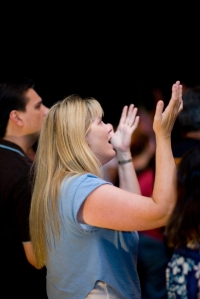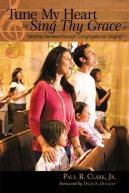 What a profound privilege it is to join in singing worship with fellow believers! After several events where congregational song and singing were the focus of discussions, teaching, sermons, research, and small group consideration, I am reminded of the simple and yet astounding miracle of joining mind and spirit with other Christians in singing worship! I think and write about these things often, but the proverbial “proof is in the pudding.” That is to say, the spiritual engagement with the living God in Three Persons shared in the fellowship of saints forgiven by His grace and gathered in His Name through singing is almost beyond description, much less definition. Consider with me some of the dynamics of what is happening during such singing when such worship is genuinely “in spirit and truth:”
What a profound privilege it is to join in singing worship with fellow believers! After several events where congregational song and singing were the focus of discussions, teaching, sermons, research, and small group consideration, I am reminded of the simple and yet astounding miracle of joining mind and spirit with other Christians in singing worship! I think and write about these things often, but the proverbial “proof is in the pudding.” That is to say, the spiritual engagement with the living God in Three Persons shared in the fellowship of saints forgiven by His grace and gathered in His Name through singing is almost beyond description, much less definition. Consider with me some of the dynamics of what is happening during such singing when such worship is genuinely “in spirit and truth:”
- Walls of division are crumbled as the Gospel of Jesus Christ demonstrates its power to overcome divisions of race, gender, wealth, social status, intellect, talent, athleticism, or physical beauty. In genuine worship singing the church demonstrates an answer to Jesus’ High Priestly prayer in John 17 that we would be one, and is answering that prayer in real time and space.
- God’s story is retold, and worshipers are invited in to find their place in the story. Biblical songs root worshipers in the stream of God’s praise, His deliverance, and His character. Poetic inferences of scriptural truth “strum the slumbering chords again” to bring worshipers to recount the acts of God and respond in celebration, or confession, or prayer, renewed covenant. In worship we remember “great things He has done,” and respond with “Praise the Lord!”
- Mutual ministry is engaged as every singing worshiper edifies every other singing worshiper at the same time that the other worshiper edifies the first singer. That dynamic is multiplied across the room of singing worshipers exponentially as every one is ministering to every other one, and vice versa. Plus the composite ministry of the singing congregation ministers as a collective entity to every worshiper and to any outsiders who happen to hear.
- Moments of significance are embraced and embedded in a congregation’s memory. Whether times of deep sadness and longing sorrow, or the most joyous of joys in times of happiness, those moments are stamped through the attachment of psalms, hymns, and spiritual songs that accompany and express the church’s response, whether praise, prayer, or sympathetic concern. Through these times a hymn or worship song becomes a signature of the congregation’s shared experience of faith, and when it is sung it serves not only in its intended meaning, but also as a reminder of its new significance. Often re-singing of the hymn or song will bring association with the emotions and ministry present in its previous singing. Indeed a hymn or worship song may become something of an Ebenezer (1 Samuel 7:12-13) reminding worshipers of the Lord’s help, provision, or other character trait. With such songs a congregation may find that each time it is sung the church reaches a more profound Alleluia!
- The body of Christ is formed and strengthened as individual worshipers give themselves over to the corporate fellowship of saints, and love one another with brotherly affection, and try to outdo one another in showing honor. (Romans 12:10) In singing the many members are one body joining to sing one song of praise, walking together by faith and not by sight.
- Faithful saints are sent out to make disciples, baptize believers, teaching and preaching the Word. The song and its singing inspire, encourage, and embolden the faithful to “take up their cross and follow Christ.” Empowerment may not occur in the singing itself, but certainly it is echoed and declared with fresh fire when sung invoking the Name of Jesus to Whom all authority in heaven and earth is given. It is in His Name we are sent because we have “a story to tell to the nations.”
- A triumphant tone is sounded and flavors all Christian worship in light of the truth of the Gospel that “hails a new creation” and harkens us to sing the sweet song of salvation in full assurance of faith, knowing Christ is ultimate Victor and that our singing accompanies our “marching to Zion” right up to the day we join the sacred throng in the very presence of Jesus and fall at His feet to “crown Him Lord of all” and join the song we have been singing all along,
Worthy is the Lamb who was slain, to receive power and wealth and wisdom and might and honor and glory and blessing!
We will join with every creature in heaven and on earth in singing,
To Him Who sits on the throne and to the Lamb Be blessing and honor and glory and might forever and ever! Amen (Revelation 5:9-13)
Just in these past few days I have been part of singing that reveals these traits that are characteristic of worship in spirit and truth. It cannot help but fill the heart to overflowing. In familiar yet fresh ways it stirs the soul. Oh that we all might “join in a song with sweet accord.”




